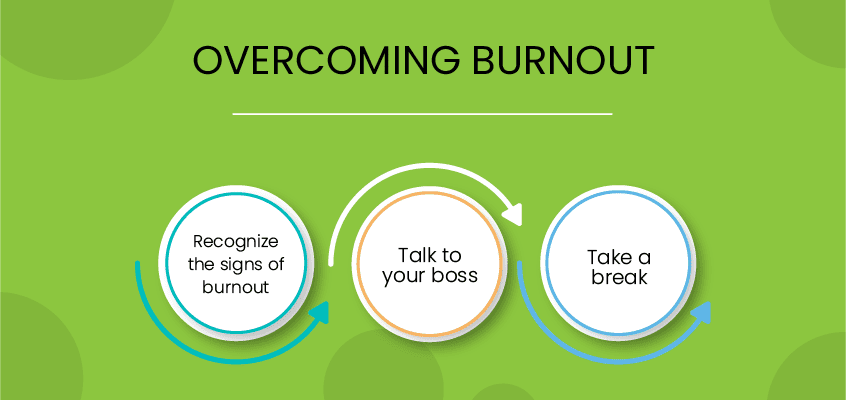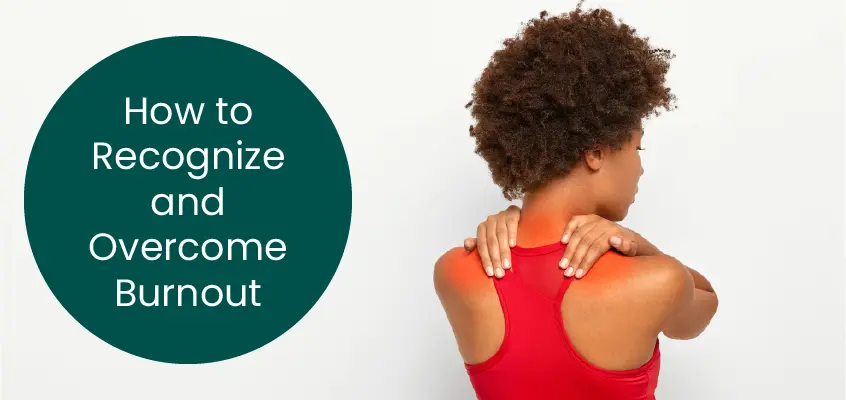Introduction
Cases of burnout have been on the rise lately, and with the various demands of the job market, we cannot help but expect it to happen. Burnout occurs when we are overworked and feel that we can’t cope with the demands made of us.
A recent study by Microsoft that surveyed 20,000 people in 11 countries found that around 50% of the participants felt overworked or had experienced burnout at some point in their careers. This blog post will look at the causes of burnout and how we can help to prevent it from happening to us.
What is burnout?
Burnout[1] is physical and mental exhaustion after extended periods of stress. The state of burnout is not due to just one thing or one day of extra hard work; it is a progressive condition after months of long work hours, high work pressure, and unrealistic personal goals. It is harmful in the long run because the stress can become chronic and lead to anxiety or depression.
Burnout affects our health and relationships. The most common symptoms of burnout include loss of enthusiasm, cynicism, exhaustion, and, ultimately, a feeling of ineffectiveness. The result is burnout when we are constantly under pressure or overworked and never have time for ourselves, and this condition is highly harmful to our productivity.
If you show signs of burnout and want to recover, take a break, rest, and try to find a balance between work and personal life.
Recognising the signs of burnout
Burnout has been officially recognised [3] by World Health Organisation ( WHO) and included in ICD 11 as an occupational phenomenon for which people contact health services. To seek help, first, we need to understand the signs of burnout and recognise them in us when they appear.
Here are some signs that may be indicative of burnout:
- You become stressed quickly.
- You are unable to concentrate and focus on the task at hand.
- You feel restless and have difficulty making decisions.
- You feel hopeless and defeated.
- You feel apathy and have no interest in things that are important to you.
- You feel nervous and irritable.
- You experience gastrointestinal problems such as diarrhoea and constipation.
- You experience headaches.
- You have insomnia.
While these are some common signs of burnout, it is essential to seek professional help to get an accurate diagnosis.
Causes of burnout
Work burnout happens when work becomes overwhelming, and the workplace demands begin to get to the employee. The causes of work burnout are numerous, but they tend to follow a pattern. Work stress can come from several areas:
Work Environmental factors:
- Working in an environment where you feel you have little control can be a significant source of stress and result in burnout.
- Work overload can cause burnout. Too many tasks with little or no support, not having a flexible schedule, or being overworked can lead to burnout. You are probably headed for it if you have too much to do in too little time.
- Relationship issues are a big reason.
- Sometimes we can’t say no at work field.
Personal factors:
Sometimes some personal reasons are significant issues for burnout.
- Low self-confidence,
- Inability to say No
- Perfectionism
- Lack of communication skills
- Poor time management skill
- Low-stress threshold
Psychological factors: Issues with coworkers or managers or toxic work politics may lead to anxiety and depression and also cause burnout in employees.
Overcoming burnout
Burnout at work can be a difficult and frustrating experience. Here are six tips to help overcome job burnout[2] and get back on track:

1. Recognise the signs of burnout.
If you’re feeling overwhelmed, exhausted, and unable to meet the demands of your job, you may be experiencing burnout. Recognising the signs can help you take steps to prevent or address the issue before it becomes a bigger problem.
2. Talk to your boss.
Your boss may be unaware of the signs of burnout, so you must have a conversation about what you’re experiencing. It can help them understand the situation and work with you to find a solution.
3. Take a break.
If you’re feeling burnt out, taking a break is essential. It can be anything from a long weekend to a more extended vacation. Taking time away from work can help you recharge and feel refreshed.
4. Make time for yourself.
In addition to taking a break from work, ensure you make time for yourself outside of work. It can be anything from taking a yoga class and meditation to spending time with family and friends. Doing things you enjoy can help reduce stress and promote a better work-life balance.
5. Simplify your life.
One of the best ways to overcome t is to simplify your life. It can mean decluttering your home, streamlining your daily routine, or setting work-life boundaries. Simplifying your life helps reduce stress and makes managing your workload more manageable.
6. Seek professional help.
If you’re struggling to manage it alone, don’t be afraid to seek professional help. A therapist can help you identify the root causes of your stress and develop a plan to address them.
Conclusion
Work burnout is characterised by mental and physical exhaustion from prolonged work or an unhealthy work environment. If you’re struggling with burnout, seek professional help from a mental health specialist. Contact United We Care today to speak to a licensed psychologist who can guide you to healthier lives.
| [1] | M. Smith, “50% of workers are burned out, and ‘productivity paranoia’ could be making it worse: ‘People are just worn down,'” CNBC, 06-Oct-2022. [Online]. Available: https://www.cnbc.com/2022/10/06/microsoft-50-percent-of-people-are-burned-out-at-work.html. [Accessed: 01-Feb-2023]. |
| [2] | “Job burnout: How to spot it and take action,” Mayo Clinic, 05-Jun-2021. [Online]. Available: https://www.mayoclinic.org/healthy-lifestyle/adult-health/in-depth/burnout/art-20046642. [Accessed: 01-Feb-2023]. |
| [3] | E. Scott, “How to watch for signs of burnout in your life,” Verywell Mind, 28-Apr-2006. [Online]. Available: https://www.verywellmind.com/stress-and-burnout-symptoms-and-causes-3144516. [Accessed: 01-Feb-2023]. |





